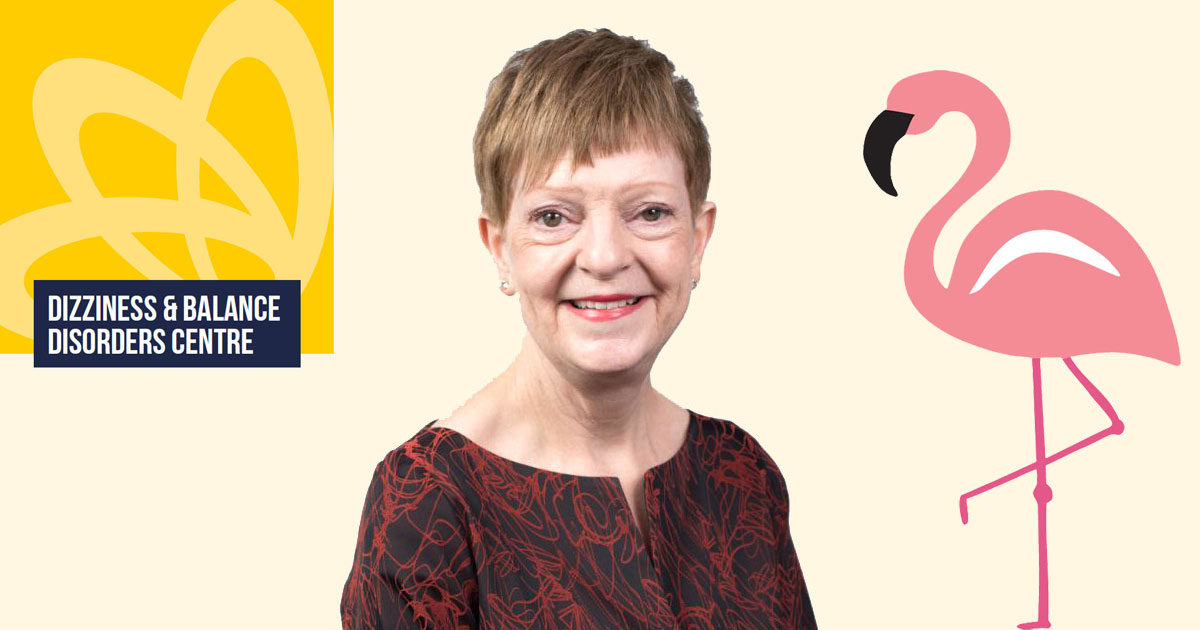
Close your eyes and stand on one foot.
It’s hard, isn’t it?
Now imagine having that same disorienting feeling on two feet, and with your eyes open.
Balance is something most of us take for granted and never need to think about – until we lose it. Unlike Fiona Flamingo, who is next to me in my picture, above.
During Balance Awareness Week (September 19-25, 2021), I’m hoping the Dizziness & Balance Disorders Centre can raise awareness throughout Adelaide and Australia about the plight of people living with balance disorders, and the treatment options available to them.
As a Neurological Physiotherapist (Neurophysio), who has specialised in Vestibular (Neuro-otological) Physiotherapy, which is a sub discipline of neurology, I have spent many decades working with patients to alleviate their suffering and help them find ways to regain balance, mobility, and happiness.
While there are some Neurologists who specialise in Neuro-otology, I’ve taken a different pathway, via Physiotherapy, to help my patients understand why they’re feeling dizzy or out of balance?
If you’re new to balance disorders, you have some new words to learn, like Vestibular system
While most people may not be familiar with the word “Vestibular”, once you start researching your balance or dizziness symptoms during Balance Awareness Week, you’ll quickly learn that your Vestibular System exists within your inner ear, from where it sends signals to your brain to tell you where you are in space, whether you are a gymnast twirling around upside down, your eyes are open or closed, or you are in the dark.
If you’ve ever had that awkward and even scary feeling when you lose balance, even if it’s momentarily, that’s your Vestibular System malfunctioning.
Whether these bouts of dizziness, vertigo, or nausea come on gradually or develop suddenly, they can make many of life’s routine tasks virtually intolerable.
For the patients I work with at the Dizziness & Balances Disorders Centre in Adelaide, everyday life (from getting around your house to doing the grocery shopping) becomes a progressively challenging obstacle course to navigate. It is exhausting!
The key aims of this article and Balance Awareness Week are to let you know you are not alone and to shine a light on invisible balance disorders.
VeDA, the Vestibular Disorders Association, began Balance Awareness Week in 1997, and I’m making sure we do our bit to help raise awareness so that my colleagues throughout the medical fraternity can better understand the vestibular patient experience and be empathetic to those who need our support, namely, the family, friends, co-workers, and neighbors of people with balance disorders.
Living with balance disorders
There are important things to consider when you’re living with a balance disorder.
Firstly, you will need to find ways to be at peace with the fact that many people around you will experience perfect balance and some gifted humans, like dancers from the company, Gravity & Other Myths, will take balance to a new level, like they’ve been doing at Her Majesty’s Theatre in Adelaide in the days leading into Balance Awareness Week.
Secondly, you will discover that while many balance disorders are incurable, those of us who specialise in this field can now use faster and more accurate diagnosis to greatly improve your quality of life as you live with these “invisible chronic” illnesses.
And, thirdly, you will learn that practitioners like me can equip you with effective coping strategies, as well as trialling new tools, when appropriate, like BalanceBelt, which I’ve written about previously: Reflections on a belt that helps people with severe balance disorders.
If you know someone living with a balance disorder, or supporting someone who does, please share this article with them, and suggest they click through to read more in the two article links above. This way, we’ll be able to spread awareness and support.
And, of course, if you are feeling symptoms of dizziness, vertigo, or nausea, please contact the Dizziness & Balance Disorders Centre so we can assess how we might be able to help.
